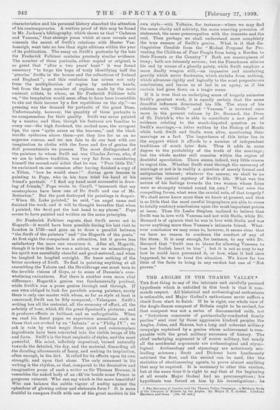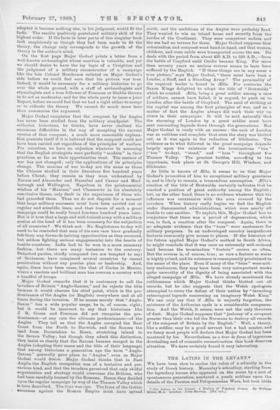THE ANGLES IN THE THAMES VALLEY.* THE first thing to
say of the intricate and carefully pursued hypothesis which is unfolded in this book is that it com- mands respect. All historical and archaeological enthusiasm is estimable, and Major Godand's enthusiasm never suffers a cheek from start to finish. If he is right, our whole viewef the Anglo-Saxon conquest of Britain ought to be revised, for that conquest was not a. series of disconnected raids, not
"fortuitous concourse of patriarchally-conducted family parties" sent over by those aggreseive kindred peoples the Angles, Jutes; and Saxons, but a long and coherent military campaign captained by a genius whose achievement is corn- parable with the great military successes of history. The chief underlying argument is of course military, but nearly all the accidental arguments are archaeological and etymo- logical. Archaeology and etymology are notoriously mis- leading sciences ; Scott and Dickens have handsomely satirised the first, and the second can be used, like the statistics of electioneering agents, to prove almost anything that may be required. It is necessary to utter this caution, but at the same time it is right to say that at the beginning at all events Major Godsal had no preconceptions ; his hypothesis was forced on him by his investigations ; he
* 7'he Storming of London and the Thames Valley Campaign a Military Sttniv of the Conquest of Britain by the Angles. Ity Major P. T. Godaal. Loadou Harrison and sons. flOs. Od, not.] adopted it because nothing else, in his judgment, would fit the facts. The results positively postulated military skill of the highest order. If the *facts in later parts of this singular book leek suspiciously as though they had been made to fit the theory, the change only corresponds to the growth of the theory in the author's mind.
On the first page Major Godsal prints a letter from a well-known archaeologist whose sanction is valuable, and yet we should desire to have the icy logic of a Creighton and the judgment of a ,military reconstructor of a campaign like the late Colonel Henderson enlisted on Major Godsal's side before we could feel sure that his picture was true. Indeed, it would be necessary for a military historian to go over the whole ground, with a staff of archaeologists and etymologists and a true follower of Freeman or Stubbs thrown in to act as moderator, and for the whole party to issue a joint Report, before we could feel that we had a right either to accept or to ridicule the theory. We cannot do much more here than summarise the argument.
Major Godsal complains that the conquest by the Angles has never been studied from the military standpoint. The orthodox historians, he thinks, have never realised the enormous difficulties in the way of accepting the current version of that conquest; a much more reasonable explana- tion presents itself if it is believed that the conquest could not have been carried out regardless of the principles of warfare. For ourselves, we have no objection whatever to assuming that the English strategists were perfectly "modern" in their practices, so far as their opportunities Went. The essence of war has not changed ; only the applications of its principles change. The maxims of war to-day are the same as those the Chinese studied in their literature five hundred years before Christ; they remain as they were understood by Xerxes and Alexander and Hannibal and Caesar and Marl- borough and Wellington. Napoleon in the quintessential wisdom of his "Maxims," and Clausewitz in his absolutely conclusive theses, only dealt in the experience Of those who had preceded them. Thus we do not dispute for a moment that large military successes must hate been carried out on regular and scientific lines, and that traces of midi a great campaign could be easily found fourteen hundred years later. But is it true that a large and well-trained army with a military genius at the bead of it has been necessary for the subjection of all countries P We think not. No Englishman to-day will need to be reminded that men of his own race have gradually felt their way forwards (seizing opportunities as they occurred, but seldom fighting serious engagements) into the hearts of hostile countries. India had to be won in a more summary fashion, but there are many instances to the contrary. Dettuthed parties, chiefly composed (we are tempted to say) of Scotsmen; have conquered several countries by casual penetration without any precise plan or leadership. And, again, there have been cases, like that of Cortes in Mexico, where a resolute and brilliant man has overrun a country with a handful of troops.
. Major Godsal remarks that it is customary to call the invaders of Britain "Anglo-Saxons," and he rejects the title because it would obscure his chief point, which is the pre- dominance of the Angles (or English) everywhere and at all times during the invasion. If he means merely that "Anglo- Saxon" " has a wide popular usage, he is, of course, right; but it would be incorrect to say that historians like J. R. Green and Freeman did not recognise the pre- dominance—at any rate the ultimate predominance—of the Angles. They tell us that the Angles oecupied the East Coast from the Forth to Harwich, and the Saxons the land from Dorsetshire to Essex, stretching inland to the Severn Valley; but though they admit this distinction, they insist so clearly that the Saxons became merged in the Angles (adopting their name and the title of their language) that among historians a generation ago the term "Anglo- Saxons" generally gave place. to "Angles" even as Major Godsal would desire. Major Godsal thinks that in East Anglia the English occupation was of a tentative and pre- Carious kind, and that the invaders perceived that oely skilful erganiiation and strategy would overcome the Britons, who -bad been carefully trained by the Romans. Hence they decided upon the regular campaign by way of the Thames Valley which is here descrihed. The time was ripe. The fame of the Gothic successes against the Roman Empire lutist have spread
north, and the ambitions of the Angles were probably fired.' They Wanted to win an island home and security from the hordes of the Continent. They were competent sailors: and the sea had no terrors for theni. 'Major Godsal supposes that colonisation and conquest went hand-in-band, and that women, children, and even cattle were transported across the sea. He deals with the period froin about. 450 A.D. to 520 A.D.,—from the battle of thayford until Cerdie became King. For More than seventy years no serious reverse seems to have been suffered by the English. "If these things are in any sense a true picture," says Major Godsal, "there must have been a Leader, a Staff, and a Standing Army." The personality- of the requited leader is found in Alla. For centuries the Saxon Kings delighted to adopt the title of "Bretwalda" which he created. /Ella, being a great soldier among a rico of soldiers, cannot have failed, it is argued, to push on to London after the battle of Cratyford. The need of striking at the capital was among the first principles of war, and as a matter of fact the Angles always did work their way up rivers in their campaigns. It will be. said naturally that the storming of London by a great soldier must have sent resounding legends down through the generations. But Major Godsal is ready with an answer : the sack of London was so ruthless and complete that even the story was blotted out, as it was again in the reduction of Silcheater. The evidence as to what followed in the great campaign depends largely upon time existence of the terminations " tun " ("ton" to-day), "stead," and " ham " throughout time Thames Talley. The greatest battles, according to time hypothesis, took place at St. George's Hill, Windsor, and Silichester.
As little is known of 2Ella, it seems to us that Major Godsal's promotion of him to exceptional military greatness is, and is likely to remain, a tremendous assamptiOn:
creation of the title of Bretwiilda certainly indicates that he reached a position of great authority among the English; but, on the other hand, there is no evidence whatever that his influence was coextensive with the area eovered by the invaders. When history really begins we find the English under disconnected adininistrations, which Were nearly, all hostile to one another. To explain this, Major Godsal has to conjecture that there was a period of degeneration, which was, in fact, a reaction after the conquest. Again, there is no adequate evidence that the "buns" were enclosures for military purposes. In an undeveloped country insignificant features commonly give names to places. If the historian of time future applied Major Godsal's method to South Africa., he 'might conclude that it was once an extremely well-wnteted land because the termination " fontein" occurs so often. But the reverse is, of course, true; so rare a feature as water is highly prized, and its existence is consequently proolstimedin the name of the place. Even if many of the " tuns " were mili- tary enclosures, they may have been very unimportant works quite unworthy of time dignity of being associated with time alleged campaign of 2Ella. We have already mentioned the ruthlessness which Major Godsal thinks blotted out all records, but he also suggests that the Welsh apologists attempted to cover the defeat of their nation by "inventing extravagant legends concerning an imaginary Welsh King." We can only say that if Alls, is unjustly forgotten, the existence of the Arthurian cycle is a considerable compensa- tion. And the Welsh, it seems, were not the only throwers of dust. Major Godsal supposes that " jealoustof a conquest greater than their own led the Normans to destroy all-records of the conquest of Britain by the English." Well, a theory. like a Soldier, may be a good servant but a bad master, and we fancy most people will declare that Major Godsal has been mastered by his. Nevertheless, as a tour de force of ingenious dovetailing and of romantic reconstruction this book deserves attention. We have certainly found it very interesting.







































 Previous page
Previous page